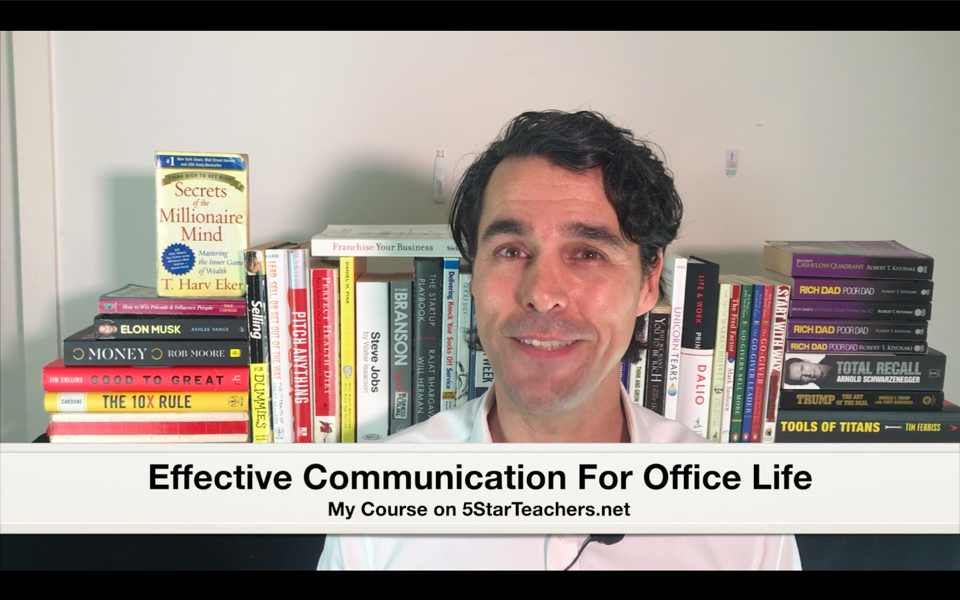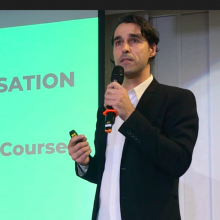Good communication vs Perfect English
“Good communication is not the same as perfect English” is what I repeatedly tell my students. Why? Because I believe that too many people are so focused on getting it perfect instead of making sure that the other person understands exactly what it is that you want to say. There’s nothing wrong with striving for perfect English but no one on earth has ever reached it, in my opinion. Sure, some come close but ask yourself “How many people know every single English word that exists AND also know how to pronounce it?” The answer: probably none. That’s right, not even the native English speakers themselves know every word that is in the dictionary. Do you know every word from the dictionary in your language? ... I thought so.
How does it look like?
If you need to communicate more effectively in the office, then this is the course for you. I’ll provide you with sentence structures, useful phrases for your daily office life, and strategies in a written and spoken English format that simply WORK wonders. Effective communication should be focused on simplicity and a win-win situation. For example: you want to say something in English in order for your colleague to do and to do it the way you want it to be done and so that you can TRUST that they will do it that way. People often call this an ORDER. But ordering is not always a win-win situation. It’s often punishment-based or reward-based communication that was invented in the late 1800s because they wanted their workforce to work harder in the factories and produce more with better quality. Okay, that worked for a while but ask yourself this: “How often do I feel happy and excited when my boss talks to me and asks me to do something?”
... I thought so.
Good vs Great
Good communication is about making sure that the other people understand what you really want to say. Great communication however, is about influencing other people. Influencing is not convincing, persuading or coaxing people to do something. Influencing is authentically speaking or writing such that the other person sees how you see it, sees the benefits of how you see it, gets excited about it and really WANTS to support you in accomplishing that task.
So we will be focusing on both: (1) influencing others and (2) communicating effectively in English with your bosses and colleagues so that they like you better, you feel better, become happier and worry less.
That’s the goal.
And along the way
By taking these Sessions with me, you build up your English confidence and fluency, you improve your pronunciation, learn new vocabulary and useful commonly-used phrases that native English speakers use in the office. You learn how to simplify things, create simple sentence structures that are easy to remember. The more useful phrases you can quickly say, the more you will use them and the more English confidence you’ll gain over time. Did you notice that I want it to be 'useful'?
Bonus: After each session I will record a short Listening Exercise for you to listen to and repeat outside of the Sessions so that you learn useful and simple but effective sentences EFFORTLESSLY.
良好的溝通 vs 完美的英語
「良好的溝通不等同於完美的英語」我如此反覆告訴學生。為何?因為我相信太多人很在意令自己的英文完美,而非確保對方完全了解他們想說的原意。我認為,追求完美的英語沒有錯,但世上沒有人曾做到。當然,有些人很接近,但問自己:「有多少人認識每一個英文字,以及知道如何發音?」答案是:可能沒有。真的,即便對於母語是英文的人,他們亦不會知道字典上的每個字。即使是你自己的母語,你可以知道字典上的每個字嗎?
……我也曾這樣想。
良好的溝通是甚麼?
如果你需要在工作上更有效地溝通,這就是為你而設的課程。我會提供句子結構、有利日常工作的語句、以及效用非凡的說寫英文策略。有效的溝通應該以簡明(simplicity)及雙贏 (win-win situation)為重點。舉個例子:你想用英語說些什麼,以便你的同事按照你想要的方式去做,這樣你就可以相信他們將會如此實行。大家通常會稱這樣為「命令」。但命令不總是雙贏,而是基於賞罰的溝通。這是1800年代後期的產物,源於當時想讓工廠工人更勤力工作,以及生產更多品質好的東西。好的,這的確是曾經有效過一段時間,但試問問你自己:
「有多少次,當我的上司叫我去做一些工作時,我會覺得開心和興奮?」
……我也曾這樣想。
好 vs 傑出
好的溝通是確保別人理解你真正想表達的意思;傑出的溝通則是影響別人。影響不是說服、勸服、誘使別人去做甚麼。影響是真誠地說話或書寫,令人看到你怎樣看,看到你這樣看的好處,為此而興奮以及由衷地想支持你去完成這件事。
所以我們將會有兩個重點:1)影響別人,以及 2)以英語和你的上司及同事有效溝通,從而令他們更喜歡你、令你感覺更好、更快樂和更少憂慮。
這就是目標。
與此同時
與我上這些課堂,你會增強用英語的信心、用得更流利、改善發音、學會新的詞彙,以及學會原生英語人工作中常用的語句。你會學懂如何簡化表達,創作簡單易記的句子結構。當你有越多易說出口的實用語句,你就會用得更多,漸漸地增加用英語的信心。你有沒有留意到,我是想你的英文變得「有用」?
額外奬賞:
每一堂之後,我會錄一小段聆聽練習讓你在課堂外反覆聆聽,讓你毫不費力地學會簡單好用,卻對溝通有效的句子。
(Translated by Barry Lam. Edited by Sonia Chan)
The Teacher
Important before you book






